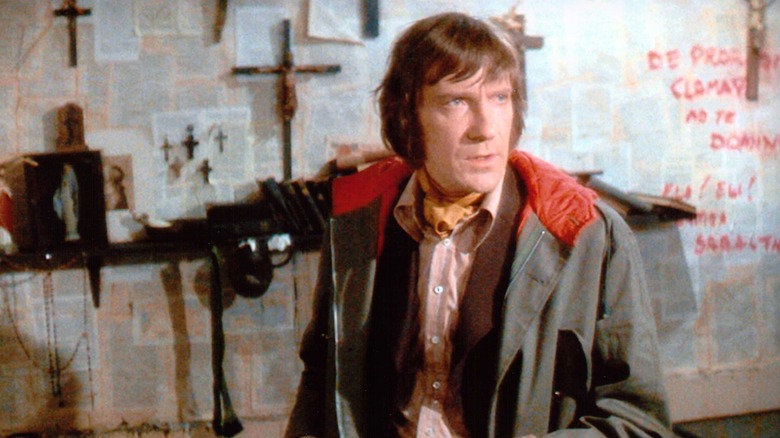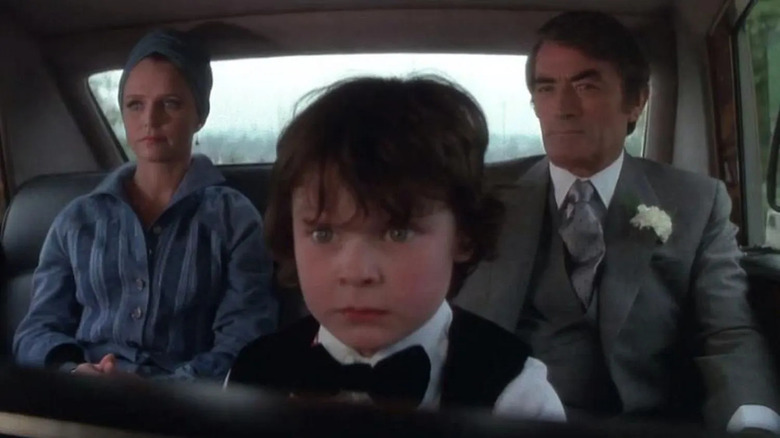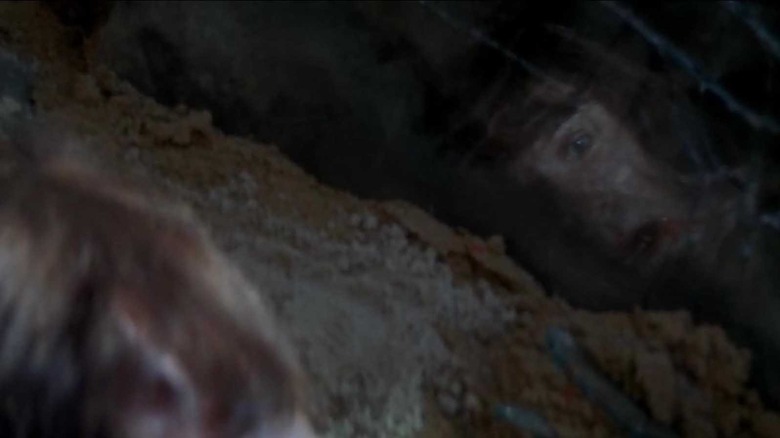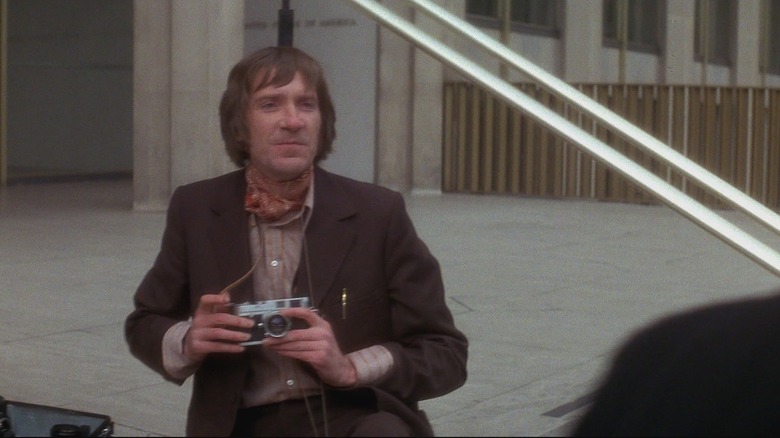David Warner's Scene In The Omen Scarred Us For Life
While I was living in Prague back in 2005, a friend suggested we audition for bit parts in "The Omen" remake, which was filming in the city. I couldn't stand the idea a new version, so I turned the idea down flat, socking it to 20th Century Fox by depriving them of my talents. That'll teach 'em! I had such strong loyalty to the original film because it was one of those scary movies I saw when I was a bit too young, and it scarred me for life. In a good way, that is; it contributed to my lifelong love of horror, which eventually led me to writing about cinema.
Richard Donner's gloomy blockbuster is high-gloss pulp, wrapping its schlockier elements in po-faced portentousness and Jerry Goldsmith's black mass whisperings and wailings. It follows Robert Thorn, an American diplomat who gradually comes to believe his adopted son is the Antichrist, playing fast and loose with the Book of Revelation to create an atmosphere of ancient evil and impending doom, complemented by some breathtakingly brutal freak death sequences that suggest everything is foretold. The film is given extra weight by the authoritative presence of Gregory Peck as Thorn and Lee Remick as his ill-fated wife, joined by a trio of excellent British actors in key roles.
Billie Whitelaw gave her most famous performance as a demonic nanny, and Patrick Troughton is superb as a terrified priest who tries to warn Thorn before it's too late. Best of all, though, is David Warner as a photographer whose pictures predict the ghastly deaths of anyone who tries to interfere with Satan's plan. While the big Hollywood stars give solid but rather distant performances, he's the most relatable character in the film. And he suffers the most horrific demise.
The setup
Robert Thorn (Gregory Peck) is in Rome, rushing to the hospital where wife Kathy (Lee Remick) is giving birth to their first child. The baby dies, and Thorn is approached by a shady priest who suggests adopting an orphaned newborn as a replacement without Kathy's knowledge. This is the first dodgy decision he makes.
They name the kid Damien, and we skip forward five years to find Thorn taking up the role of ambassador to the UK. All is looking rosy for the Thorns until menacing dogs start lurking around their estate and Damien's young nanny inexplicably hangs herself at his birthday party. This leaves a vacancy for Mrs. Blaylock (Billie Whitelaw), a replacement nanny who turns up uninvited at the house. Remarkably, for a couple with a husband in such a high-profile position, they don't see anything concerning about this and hire her on the spot.
Also present at Damien's party to witness the tragedy was Robert Jennings (David Warner), a curious freelance photographer who's always on hand to take a few snaps. He later photographs Father Brennan (Patrick Troughton), who is desperately trying to warn Thorn about Damien, but the diplomat writes him off as insane. When Jennings develops the images, he discovers mysterious lines on all the photos of the priest.
After Brennan is skewered by a falling lightning rod in a sudden storm and another accident causes Kathy to miscarry another baby, Jennings approaches Thorn with his portfolio. He has found sinister lines on photos of the nanny that look eerily like a rope around her neck, and reveals that he also has skin in the game. While photographing Brennan's room after the priest's death, he accidentally captured a shot of himself in a mirror. The image reveals a sharp line across his throat.
The scene
Once Thorn realizes Brennan wasn't just a crank, he and Jennings travel to Italy to uncover Damien's true heritage. Evidence stacks up that Damien really is the Antichrist and Thorn's natural son was murdered just after childbirth to make way for the evil sprog. After Mrs. Blaylock kills Kathy by throwing her out of a hospital window, Thorn decides that Damien has to die.
Next stop is Israel, where an archaeologist tells him how to do it: He must kill the child by placing seven ceremonial daggers in the shape of a crucifix. The prospect of repeatedly stabbing a little boy makes Thorn waver, and he throws the knives away. Jennings says that if Thorn won't do it, he will, sealing his fate.
While retrieving the daggers, a clumsy driver knocks the handbrake on his lorry, sending it trundling down a hill toward the photographer. It hits a wall, sending a sheet of plate glass hurtling off the back, decapitating Jennings. We knew it was coming, but that doesn't prepare us for how horrible it is.
Richard Donner obviously knew this was the money shot, and he sure makes the most of it, stretching the moment out over six shots from six different angles as Jennings' noggin is separated from his shoulders and sent spinning through the air. As a final horrific touch, Jennings' head comes to rest staring into another pane of glass, continuing the reflection motif of his storyline. If it's true that a human can retain consciousness for several seconds after decapitation, it's just possible he was alive long enough to see his photo's premonition come to pass.
David Warner's performance really sells it
While "The Omen" is most famous for its death sequences, Jennings' "Twilight Zone"-style character arc with the supernatural camera is what really keeps the narrative ticking along as we anticipate how he will eventually die. If we had any doubt before, his grisly death shows us the devil really is playing for keeps in this movie.
We don't get anything about Jennings' backstory, but David Warner's measured performance gives us a really good sense of who he is. In his rumpled blazer and cravat, he cuts a faintly dandyish and solitary figure who we might imagine down Carnaby Street taking photos of The Beatles and Jimi Hendrix in his younger years. His matter-of-fact approach contrasts well with Brennan's rantings, which is why Thornton instinctively trusts him. Maybe the two men could have been good friends under less trying circumstances.
If there is one criticism of the Jennings character, it's more down to David Seltzer's screenplay, which makes him a bit Basil Exposition at times. Warner overcomes it, though, completely selling each grim revelation with pragmatism and understated delivery. Jennings comes across as a good guy you might meet in a pub, and because he's so relatable, we really hope he can somehow avert his fate.
Unfortunately not. "The Omen" is not that kind of movie, and its death sequences still pack a punch almost 50 years later. The sequels upped the ante on the freak accidents, but none topped Robert Jennings' gnarly demise, a shockingly undignified end to a character played with such dignity by Warner. That's what makes it so harrowing, and it still gets me every time.



